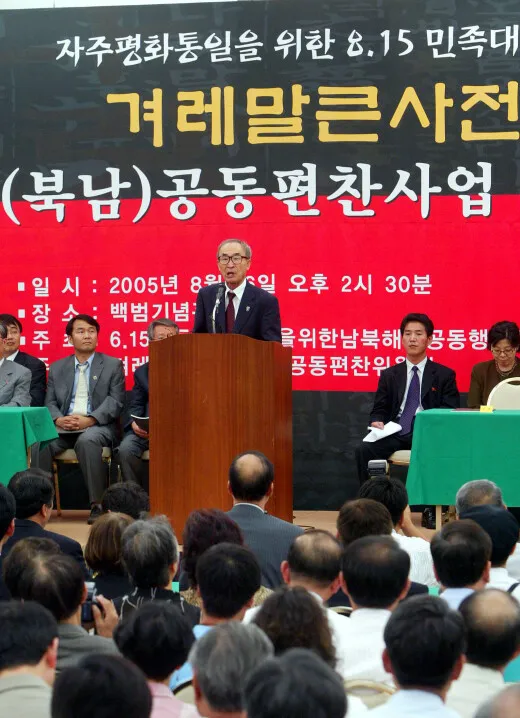hankyoreh
Links to other country sites 다른 나라 사이트 링크
Integrated Korean dictionary faces funding crisis

By Choi Jae-bong, Senior staff writer
The compilation of the “Gyeoremal-keunsajeon,” Big Dictionary of the Korean People’s Language, is facing a crisis. The dictionary is an integrated North Korean and South Korean dictionary pursued by agreement between the two countries’ governments in an effort to overcome the increasingly severe heterogeneity of their versions of Korean since the division of the Peninsula.
Poet Ko Un, chair of the Joint Board of North Korea and South Korea for the Compilation of Gyeoremal-keunsajeon, issued an “appeal to the people of South Korea” on Monday in which he said, “The Gyeoremal-keunsajeon project is in danger of ending due to the relevant authorities’ refusal to provide budget support.”
Ko went on to call for “interest and support so that the Gyeoremal-keunsajeon project, which has achieved the most results out of all the inter-Korean exchange and cooperation efforts to date, can continue.”
The compilation of this dictionary, which was approved in October 2004 as an inter-Korean collaborative socio-cultural effort, has consistently produced results, with four joint inter-Korean compilation meetings held each year between 2005 and 2009. A total of twenty meetings have been held.
In April 2007, the project gained particular force with the National Assembly’s enactment of the Act on the Joint Board of South and North Korea for the Compilation of Gyeoremal-keunsajeon. Since then, the project has received a budget of around 3 billion Won ($2.65 million) per year from the government.
But in 2010, the Unification Ministry’s inter-Korean exchange and cooperation council, which has authority to review and make decisions on the budget, gave approval in January for only 1.65 billion Won for institution management expenses out of the total budget of 3 billion Won. It has delayed approval on the remaining project expenses of around 1.37 billion Won, which include 290 million Won for writing expenses, 210 million Won for new vocabulary project expenses, and 600 million Won for North Korean compilation assistance.
The dictionary’s South Korean compilation committee said, “The relevant organization has consistently expressed a negative view on this project, and with incidents such as the Cheonan situation on top of that, even discussions on support for compilation expenses have been suspended.”
“For this reason, the North Korean and South Korean committees have been unable to exchange their first drafts and the joint entry writing process has been halted, including examinations and reexamination of the other country’s drafts, and research workers are now leaving in search of new work.”
The project was approximately 53 percent complete as of late 2009, with writing scheduled to finish by 2013. But with 2010 budget support cut off, this plan appears likely to encounter setbacks.
“In Germany, East and West Germany joined forces to make the ’Goethe Dictionary‘ in spite of the national division, and China and Taiwan have opened up a way for speech with the compiling of the ‘cross-strait dictionary’ as they await the moment for unification,” said Ko. “I implore the government to approach the integrated North Korean and South Korean compilation of the Gyeoremal-keunsajeon within an academic and ethnic historical context rather than with an ideological and political approach.”
A Unification Ministry official said, “This year, a decision was made, in light of factors such as inter-Korean relations, to reduce the budget for projects involving North Korean and South Korean participation and to structure the budget more toward projects conducted by South Korea internally.”
Please direct questions or comments to [englishhani@hani.co.kr]
Editorial・opinion
![[Editorial] Korea must find a new equilibrium between US and China [Editorial] Korea must find a new equilibrium between US and China](https://flexible.img.hani.co.kr/flexible/normal/500/300/imgdb/original/2025/1103/3117621579572038.jpg) [Editorial] Korea must find a new equilibrium between US and China
[Editorial] Korea must find a new equilibrium between US and China![[Column] Trump’s protection racket [Column] Trump’s protection racket](https://flexible.img.hani.co.kr/flexible/normal/500/300/imgdb/original/2025/1031/6817618980064942.jpg) [Column] Trump’s protection racket
[Column] Trump’s protection racket- [Editorial] Devil will be in the details of Korea-US trade deal
- [Editorial] Lee must stick to guiding principles in tariff negotiations
- [Editorial] Korea must stick to its principles while working with US, Japan
- [Guest essay] What’s new about the “new Middle East”?
- [Editorial] Asia Future Forum brings bright minds together to explore democracy’s future
- [Column] Russia and China’s golden ticket to destabilizing the dollar
- [Correspondent’s column] Martial law comes for the United States
- [Column] The end of the road for NewJeans, or a new beginning?
Most viewed articles
- 1Yoon said he’d ‘shoot and kill’ certain political figures, testifies former Army commander
- 2USFK sprayed defoliant from 1955 to 1995, new testimony suggests
- 3Korean military expert calls pursuit of nuclear submarine ‘vanity of a nation drunk on delusion of b
- 4Now begins grind of working out nitty-gritty of US-Korea deals on nuclear submarines, energy
- 5ADOR may be winning its legal battle with NewJeans, but at what cost?
- 6Don’t hold your breath for China to lift restrictions on Korean cultural content
- 7Kim Yong-nam, veteran North Korean diplomat who met several South Korean presidents, is dead at 97
- 8[Editorial] Korea must find a new equilibrium between US and China
- 9[Interview] Haecho knew she might die. Trying to bring aid to Gaza was worth the risk.
- 10Nepotism remains prevalent at Korean chaebols